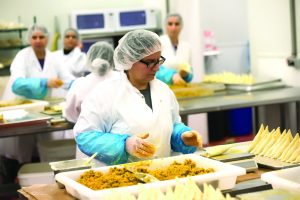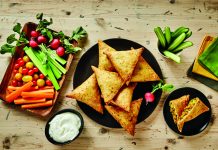As the philosophy of multiculturalism grows, so too does cultural diversity. There is an ever-increasing demand for ethnic foods to feed hungry consumers across North America, ready to try new flavours in the wake of globalism. One such company that has caught the upward trend is Surrey-based Nana’s Kitchen who produce 25,000 samosas per day in their 22,000 square foot facility.
Distributing to all major Canadian and American grocery store chains, Nana’s Kitchen now has set its sights to expand to elementary schools, universities, and government public buildings using BC as the test market. “We also are available in coffee shops such as Blenz and Waves. The next step is schools and hospitals,” shares Shelina Mawani, Co-Founder of Nana’s Kitchen. “Most school cafeterias already sell pre-prepared sandwiches, wraps, pitas, and pizza, so why not samosas?”
BC Ministries of Education and Health has hefty safety guidelines for companies to follow. “Many of our products are already approved by the BC Brand Name Food Guide, which is the body that ensures ready-to-eat foods and beverages meet the nutritional standard established by the BC Ministries of Education and Health,” she says.
All 50 of Nana’s Kitchen staff are required to be Food Safe and WHIMS certified, and they all go through a rigorous training process before they even step on the floor. “This is to ensure that they fully understand the safety which we follow,” Mawani points out. “We have yearly training for all staff to ensure they are refreshed on old procedures as well as understand new procedures as they arise.”
Mawani also points out that the Canada Food Inspection Agency has an office inside of their facility. “We truly focus on safety and quality of our product. We meet all of the up to date labeling requirements as set by Canada’s Food Inspection Agency and by the US Department of Agriculture,” she claims.
They are also BRC and HACCP certified. BRC is the British Retail Consortium, a trade association based in the UK that guarantees standardization of quality, safety and operational criteria used by over 26,000 certified suppliers in over 130 countries. HACCP is the Hazard Analysis Critical Control Point which is an international standards organization for food safety recommended by the United Nations and used by most countries around the world. This allows Nana’s Kitchen to implement a recall program which gives them control over their product should there be any contamination detected in a batch of samosas and chimichangas.

“Having BRC and HACCP allows us to be in all the big chain grocery stores because of the extreme safety measures we take,” says Mawani. “Our high regard for safety has been key to our success so far. Our clients like that they can get their samosas from a trusted source.”
Nana’s Kitchen makes samosas in seven different flavours and recently expanded to include chicken chimichangas in their product line, all of which are available in the deli section of your favourite grocery store.

























